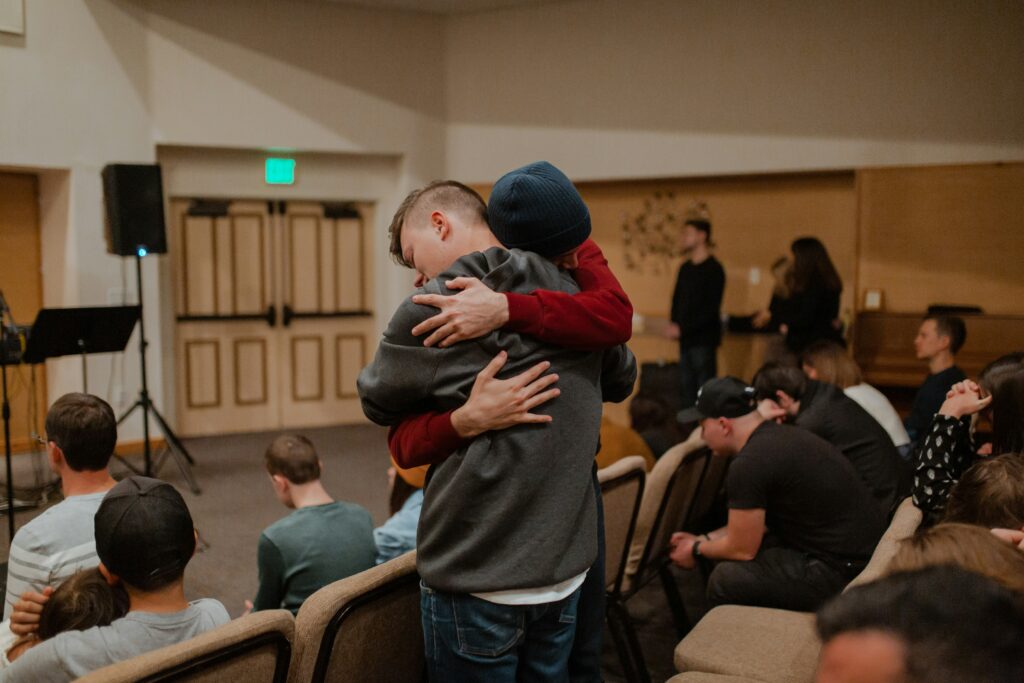
4 Ways Church Leaders Can Inspire a Spirit of Hospitality
4 Maneras en las que los Líderes de Iglesia Pueden Inspirar un Espíritu de Hospitalidad
Christian hospitality is the practice of lovingly and joyfully making room in our lives for others, especially for the poor and the afflicted. And I believe this profound truth should deeply influence how we shepherd our congregations.
Hospitality means receiving someone else, from the heart, into my life (which very often involves receiving them into my home). Hospitality entails providing for the needs, comfort, and delight of someone else, with openness, respect, freedom, tenderness, and joy. Or in other words, with all that love embodies.
If you don’t know me, I’m a foster and adoptive dad—and over the years, I’ve come to understand my role largely in terms of Christian hospitality. I now see that the loving welcome of God was never meant to terminate on me; it was always meant to fuel and nurture and sustain the loving welcome I extend to others.
When I look at our local community here in Houston, I see thousands of children (and adults) who are in need of hospitality.
These vulnerable individuals need men and women who are willing to extend to others the same hospitality they have received from God. But for these men and women to step up and take action, they need churches that will disciple them accordingly.
Here are 4 tips for pastors looking to inspire a sense of hospitality and community service in their congregations:
1) Preach the full scope of the gospel.
1) Predica el margen completo del evangelio
What is the gospel?
One common way of defining it is to say, “Jesus died for our sins.” And that’s true. Jesus did die for our sins. But think about it: how does this definition compel us to take positive action in our modern lives—like caring for vulnerable children and families?
I think we can all agree that churches should be able to articulate the gospel in a way that accounts for all that Jesus said He came to accomplish (see Luke 4:18-19, for instance).
The gospel is not just about how individual people get saved; it’s also about how God is establishing a Kingdom of justice and righteousness—not just in the distant future, but right here and right now.
The Christian gospel is the good news that the Kingdom of God has come in Christ (Matthew 4:17, Mark 1:15, Luke 4:43, Acts 8:12, etc.). As the King of Kings, Jesus has commissioned His people to disciple the nations, and to bring the entire world into the love, righteousness, justice, and equity that characterize life in His Kingdom.
This is why I believe that, rather than saying:
“Two thousand years ago, something really great happened, so let’s care for Houston’s children today.”
We can instead say:
“Two thousand years ago, the King of Kings began a project that’s still ongoing today. So for the sake of Houston’s children, will you join Him?”
When we preach and teach the full scope of the gospel, we see that caring for vulnerable children and families is at the very heart of what Jesus came to do.
LISTEN: How Any Church Can Serve Those Involved in Foster Care
¿Qué es el evangelio?
Una manera común de definirlo es decir: “Jesús murió por nuestros pecados.” Y eso es verdad. Jesús murió por nuestros pecados. Pero, piénsalo: ¿cómo nos impulsa esta definición a tomar medidas positivas en nuestras vidas modernas, como cuidar de niños y familias vulnerables?
Creo que todos podemos estar de acuerdo en que las iglesias deberían ser capaces de articular el evangelio de una manera que tome en cuenta todo lo que Jesús dijo que vino a cumplir (ver Lucas 4:18-19, por ejemplo).
El evangelio no se trata solo de cómo las personas se salvan; también se trata de cómo Dios está estableciendo un Reino de justicia y rectitud, no sólo en un futuro lejano, sino aquí y ahora.
El evangelio cristiano es la buena noticia de que el Reino de Dios ha llegado en Cristo (Mateo 4:17, Marcos 1:15, Lucas 4:43, Hechos 8:12, etc.). Como Rey de Reyes, Jesús ha encargado a Su pueblo discipular a las naciones y traer al mundo entero el amor, la rectitud, la justicia y la equidad que caracterizan la vida en Su Reino.
Por eso creo que, en lugar de decir:
“Hace dos mil años ocurrió algo grandioso, así que cuidemos a los niños de Houston hoy.”
Podemos decir:
“Hace dos mil años, el Rey de Reyes comenzó un proyecto que aún continúa hoy. Por el bien de los niños de Houston, ¿te unirás a Él?”
Cuando predicamos y enseñamos el alcance completo del evangelio, vemos que cuidar de niños y familias vulnerables está en el corazón de lo que Jesús vino a hacer.
2) Offer the hospitality of God.
2) Ofrece la hospitalidad de Dios
God is revealed in Scripture as a communion of three Persons—Father, Son, and Holy Spirit. Within this divine fellowship, love and welcome are eternally being extended. Each Person of the Holy Trinity is always and forever making room for the Others, and it was from the overflow of this hospitality that we were created.
In other words, the loving welcome that is God has been extended to you and me.
God delights in making room for us. We see His hospitality in our creation, our salvation, and our redemption. But really, every Sunday morning is an opportunity to receive the hospitality of God—and to model it for others.
As Christians, we spend all week working to build the Kingdom of God in this world—loving our neighbors, raising our children, pursuing our vocations, experiencing loss, contending in prayer, and bearing the weight of brokenness in the world.
By the time Sunday rolls around, we’re weary. And what does God do? He calls us home.
He welcomes us into His house, receives our confession, and extends His pardon. He washes us, teaches us, and hears our petitions. And then, He lays out a table.
Christian worship thus trains us to be hospitable as God is hospitable.
Dios se revela en la Escritura como una comunión de tres Personas: Padre, Hijo y Espíritu Santo. Dentro de esta comunión divina, el amor y la bienvenida se extienden eternamente. Cada Persona de la Santísima Trinidad siempre está haciendo espacio para las otras, y fue de esta sobreabundancia de hospitalidad que fuimos creados.
En otras palabras, la amorosa bienvenida que es la esencia de Dios, se nos ha extendido a ti y a mí.
Dios se deleita en hacernos espacio. Vemos Su hospitalidad en nuestra creación, nuestra salvación y nuestra redención. Pero realmente, cada domingo por la mañana es una oportunidad para recibir la hospitalidad de Dios y modelarla para los demás
Como cristianos, pasamos toda la semana trabajando para construir el Reino de Dios en este mundo: amando a nuestros vecinos, criando a nuestros hijos, persiguiendo nuestras vocaciones, experimentando pérdidas, luchando en oración y cargando con el peso de la ruptura en el mundo.
Cuando llega el domingo, estamos cansados. ¿Y qué hace Dios? Nos llama a casa.
Nos da la bienvenida en Su casa, recibe nuestra confesión y extiende Su perdón. Nos lava, nos enseña y escucha nuestras peticiones. Y luego, prepara una mesa.
La adoración cristiana nos entrena para ser hospitalarios como Dios es hospitalario.
Lee: 5 mitos sobre cómo apoyar a la comunidad de acogimiento temporal.
3) Pastor people into questioning their hesitations.
3) Pastorea a las personas para que sean capaces de cuestionar sus dudas
The call to extend the hospitality of God to needy and vulnerable people seems to elicit from us (myself included) all sorts of excuses:
“Other people are gifted at that sort of thing. I’m not.”
“I’m incredibly busy.”
“My home is too small.”
“We really try to protect our family culture.”
“It’s not safe.”
“I think I’d prefer to just make a donation.”
“Once the kids are older…”
“Once work settles down…”
“Once we buy a bigger house…”
Don’t get me wrong; not every Christian family is called to foster or adopt. But every Christian family is called to extend the hospitality of God somehow. And although seasons change, and there are good reasons to wait, it’s often true that our hesitance is really just disobedience masquerading as discernment.
In the words of Jason Johnson: “Kids in crisis can’t afford to wait until it’s most convenient for you to care for them. They don’t have that luxury. They need you to stop rationalizing what you know God is calling you to do—and just do it.”
As church leaders, we can guide our members toward prayerfully questioning their hesitations and objections. Let the Spirit lead, but the time may have come to turn talk into action.
El llamado a extender la hospitalidad de Dios a las personas necesitadas y vulnerables a menudo provoca todo tipo de excusas en nosotros (incluyéndome a mí):
“Otras personas tienen ese don. Yo no”
“Estoy increíblemente ocupado.”
“Mi casa es muy pequeña.”
“Estamos tratando de proteger nuestra cultura familiar.”
“No es seguro.”
“Prefiero hacer una donación.”
“Cuando los niños sean mayores…”
“Cuando el trabajo se calme…”
No todos los cristianos están llamados a adoptar o acoger, pero todos estamos llamados a extender la hospitalidad de Dios de alguna manera. Muchas veces, nuestras dudas no son más que desobediencia disfrazada de discernimiento.
En palabras de Jason Johnson:
“Los niños en crisis no pueden permitirse esperar hasta que sea más conveniente para que alguien los cuide. No tienen ese lujo. Necesitan que dejes de racionalizar lo que sabes que Dios te está llamando a hacer, y simplemente lo hagas.”
Como líderes de la iglesia, podemos guiar a nuestros miembros a cuestionar estas dudas y objeciones con oración. Que el Espíritu guíe, pero hoy puede ser el momento de convertir las palabras en acción.
Lee: 5 mitos sobre cómo apoyar a la comunidad de acogimiento temporal.
4) Start with the heart.
4) Comienza con el corazón
Abrir tu vida y tu hogar para otros requiere tiempo, dinero y recursos emocionales. Puede parecer más fácil hacerlo para personas fáciles de amar. Pero la hospitalidad de Cristo nos llama a extendernos hacia los pobres, los débiles y los necesitados, aquellos que no pueden retribuirnos (Lucas 14:12-14).
Según un proverbio danés: “Cuando hay espacio en el corazón, hay espacio en el hogar.”
Creo que los líderes de la iglesia tienen la responsabilidad de no solo ayudar a sus congregaciones a experimentar la hospitalidad de Cristo, sino de mostrarles la importancia de extender esa hospitalidad a otros.
Es sencillo: Dios hace espacio para nosotros, y por ende nosotros hacemos espacio para los demás.
Adoramos a un Dios que hace espacio, y es nuestro gozo y privilegio convertirnos cada vez más en Su imagen y semejanza.
I believe that church leaders have a responsibility not only to help our congregations to experience the hospitality of Christ, but to show them the importance of extending that hospitality to others.
It’s pretty simple: God makes room for us, so we make room for others. When Christians resolve to extend to their neighbors the same love and welcome they have received from God, I believe the Kingdom is near at hand.
We worship a God who makes room, and it’s our joy and privilege to become more and more like Him.
Want to learn more about how your church can extend hospitality to the people of Houston? We’d love to connect with you!


